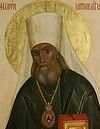

| Previous day | Next day |
| Old Style
November 19
|
Saturday |
New Style
December 2
|
|
26th Week after Pentecost.
Tone 8.
Nativity Fast. |
Fish, wine and oil allowed.
|
![]() Prophet Obadiah (Abdias) (9th c. b.c.).
Prophet Obadiah (Abdias) (9th c. b.c.). ![]() Martyr Barlaam of Caesarea in Cappadocia (304).
Martyr Barlaam of Caesarea in Cappadocia (304). ![]() Sts. Barlaam, monk, Ioasaph, prince of India, and Abenner the King, father of St. Ioasaph (4th c.).
Sts. Barlaam, monk, Ioasaph, prince of India, and Abenner the King, father of St. Ioasaph (4th c.). ![]() St. Philaret, metropolitan of Moscow (1867).
St. Philaret, metropolitan of Moscow (1867).
Martyr Heliodorus, in Pamphylia (ca. 273). Martyrs Azes of Isauria and 150 soldiers (284). Martyr Agapius of Gaza (284-305). St. Hilarion of Georgia, wonderworker of Thessalonica (875). St. Barlaam, first abbot of the Kiev Caves (1065). Uncovering of the relics of Hieromartyr Adrian, founder of Poshekhonye Monastery (Rostov) (1625). St. Ioannicius, schemaarchimandrite, of Glinsk Hermitage (1914). St. Porphyriоs of Kapsokalyvia and Kallisa (1991).
New Hieromartyrs Porphyrius (Gulevich), bishop of Simferopol, Ioasaph (Udalov), bishop of Chistopol, Michael (Kvanin), archimandrite, of Moscow, Gennadius (Rebeza), archimandrite, of Odessa, Gerasim (Sukhov), hieromonk, of Kazakhstan, Michael Dimitrev, archpriest, of Selishchi (Ryazan), John Malinovsky, archpriest, of Noviye Gorki (Ivanovo), Sergius Makhaev, archpriest, of Bogorodsk (Moscow), Constantine Mikhailovsky, archpriest, of Mordovia, James Perederiy, archpriest, of Velbovka (Kharkov), and Alexander Serebrov, archpriest, of Simbirsk (1937). New Hieromartyrs Ioasaph (Krymzin), abbot, and Peter (Mamontov), hieromonk, both of the Holy Transfiguration Guslitsky Monastery (Moscow) (1937). New Hiero-confessor Alexis (Kabaliuk), schema-archimandrite, of Khust (Carpatho-Russia) (1947).
St. Patroclus of Bourges (577). St. Egbert, archbishop of York (766). St. Simon, wonderworker of Calabria (10th c.).
Repose of Elder Cleopa of Sihastria, Romania (1998).
Thoughts for Each Day of the Year
According to the Daily Church Readings from the Word of God
By St. Theophan the Recluse

Saturday. [Gal. 3:8-12; Luke 9:57-62]
No man, having put his hand to the plough, and looking back, is fit for the kingdom of God. That is, he who thinks to be saved while glancing back at what he should abandon for the sake of his salvation, is not being saved, is not walking, is not directed toward the Kingdom of God. It is necessary to destroy once and for all everything that is not compatible with the work of salvation. Those who think to be saved see this themselves, but they always put off parting with certain attachments until tomorrow… To suddenly break with everything is too great a sacrifice. They want to give things up in a leisurely fashion, to not stand out in front of others—but they almost always fail. They introduce salvific routines, while the dispositions of their heart remain as before. At first the incongruity is very sharp: but “tomorrow,” and their promises of change shut the mouth of their conscience. In such a manner, with everything tomorrow— always tomorrow—the conscience grows tired of saying the same thing over and over, and at last, falls silent. Here thoughts start to come that things can be left this way. These thoughts strengthen, and then are established forever. An exterior which is outwardly proper is formed, with inner improperness. This is a whited sepulchre before the eyes of God. The worst thing is that the conversion of this sort of person is as difficult as the conversion of those who have become hardened in open sins, if not more difficult… Meanwhile, this person thinks that everything is fine.
Articles
 Prophet Obadiah (Abdia)The Holy Prophet Obadiah [or Abdia] is the fourth of the Twelve Minor Prophets, and he lived during the ninth century B.C. |
 Martyr Heliodorus in PamphyliaThe Holy Martyr Heliodorus lived during the reign of the emperor Aurelian (270-275) in the city of Magidum (Pamphylia). |
 Venerable Barlaam the Abbot of the Kiev Near CavesSaint Barlaam, Igumen of the Kiev Caves, lived during the eleventh century at Kiev, and was the son of an illustrious noble. |












